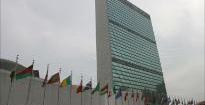Security Council Refers Libya to the International Criminal Court
 The New York Times reports:
The New York Times reports:
The United Nations Security Council voted unanimously on Saturday night to impose sanctions on Libya’s leader, Col. Muammar el-Qaddafi, and his inner circle of advisers, and called for an international war crimes investigation into “widespread and systemic attacks” against Libyan citizens who have protested against the government over the last two weeks.
The vote, only the second time the Security Council has referred a member state to the International Criminal Court, comes after a week of bloody crackdowns in Libya in which Colonel Qaddafi’s security forces have fired on protesters, killing hundreds.
Also on Saturday, President Obama said that Colonel Qaddafi had lost the legitimacy to rule and should step down. His statement, which the White House said was made during a telephone call with Chancellor Angela Merkel of Germany, was the strongest yet from any American official against Colonel Qaddafi.
The Security Council resolution also imposes an arms embargo against Libya and an international travel ban on 16 Libyan leaders, and freezes the assets of Colonel Qaddafi and members of his family, including four sons and a daughter. Also included in the sanctions were measures against defense and intelligence officials who are believed to have played a role in the violence against civilians in Libya.
The sanctions did not include imposing a no-fly zone over Libya, a possibility that had been discussed by officials from the United States and its allies in recent days.
The resolution also prohibited all United Nations member nations from providing any kind of arms to Libya or allowing the transportation of mercenaries, who are believed to have played a part in the recent violence. Suspected shipments of arms should be halted and inspected, the resolution said.
While the sanctions are likely to take weeks to have an effect, they reflected widespread condemnation of Colonel Qaddafi’s tactics, by far the most brutal crackdown in the region since antigovernment demonstrations began.
Susan E. Rice, the United States ambassador to the United Nations, called the resolution “a clear warning to the Libyan government that it must stop the killing.”
But Turkey’s prime minister, Recep Tayyip Erdogan, warned Saturday that sanctions would do more harm to Libya’s people than to Colonel Qaddafi.

